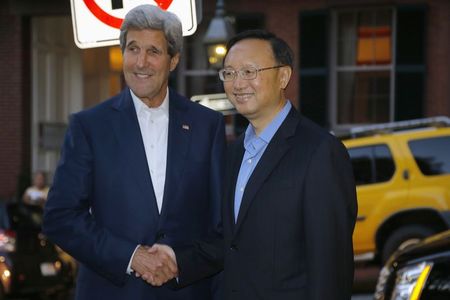By David Brunnstrom
BOSTON (Reuters) - U.S. Secretary of State John Kerry welcomed China's top diplomat, State Councilor Yang Jiechi, to his Boston home on Friday for talks aimed at warming the often strained U.S.-China relationship ahead of a summit between their leaders next month.
Kerry stood outside his imposing townhouse residence in Boston's exclusive Louisburg Square to welcome Yang with smiles and handshakes. After their dinner on Friday night, the two will hold formal talks on Saturday, when Kerry also plans to show Yang some of the sights of his native city.
Chinese and U.S. officials said the talks would cover a broad range of issues, including cooperation against Islamic State militants, the fight against Ebola, and economic ties.
Shared concern about Islamic State offers a rare convergence of security interests for Beijing and Washington, and a break from their more typical enmity on sensitive geopolitical issues, notably in the South China Sea and matters such as cyber spying.
"The Secretary and the State Councilor used the dinner for informal and in-depth discussions and to speak frankly about ways to strengthen the bilateral relationship, improve cooperation on global and regional issues, and better manage differences," a senior State Department official said.
China has significant energy interests in Iraq and is also troubled by what it says are domestic Islamist militants. Its state media has reported that militants from the western region of Xinjiang, which abuts Pakistan and Afghanistan, have sought training from Islamic State fighters for attacks at home.
Beijing has responded cautiously, though, to a call by U.S. President Barack Obama for a broad coalition to root out Islamic State militants in Iraq and Syria, saying the world should fight terror but that the sovereignty of countries must be respected.
There has been no indication of any change in this stance and Chinese officials say Beijing is already playing a role in support, including training, it is providing to Iraq's army.
Analysts familiar with U.S. thinking expect the Boston talks to include discussion of intelligence cooperation, including tracking militant movements and financing.
China is also keen to lay out a strong agenda for a summit between its President Xi Jinping and Obama in Beijing on Nov. 12 after a meeting of the Asia-Pacific Cooperation forum (APEC).
China hopes the leaders will be able to announce the completion of a text of a Bilateral Investment Treaty, though difficult and lengthy negotiations would still have to follow over access to sensitive sectors.
Cyber security has been a significant irritant to ties, and on Wednesday the U.S. Federal Bureau of Investigation said hackers it believes to be backed by the Chinese government recently launched more attacks on U.S. companies, a charge the China rejected as unfounded.
In May, the United States charged five Chinese military officers with hacking American firms, prompting China to shut down a bilateral working group on cyber security.

On Monday, Kerry is to attend the inauguration of Indonesia's newly elected president Joko Widodo in Jakarta, where he is expected to hold bilateral meetings with regional counterparts who share concerns about China's territorial assertiveness in East Asia. Cooperation against Islamic State is also expected to be a prominent theme.
(Reporting by David Brunnstrom; Editing by Ken Wills)
